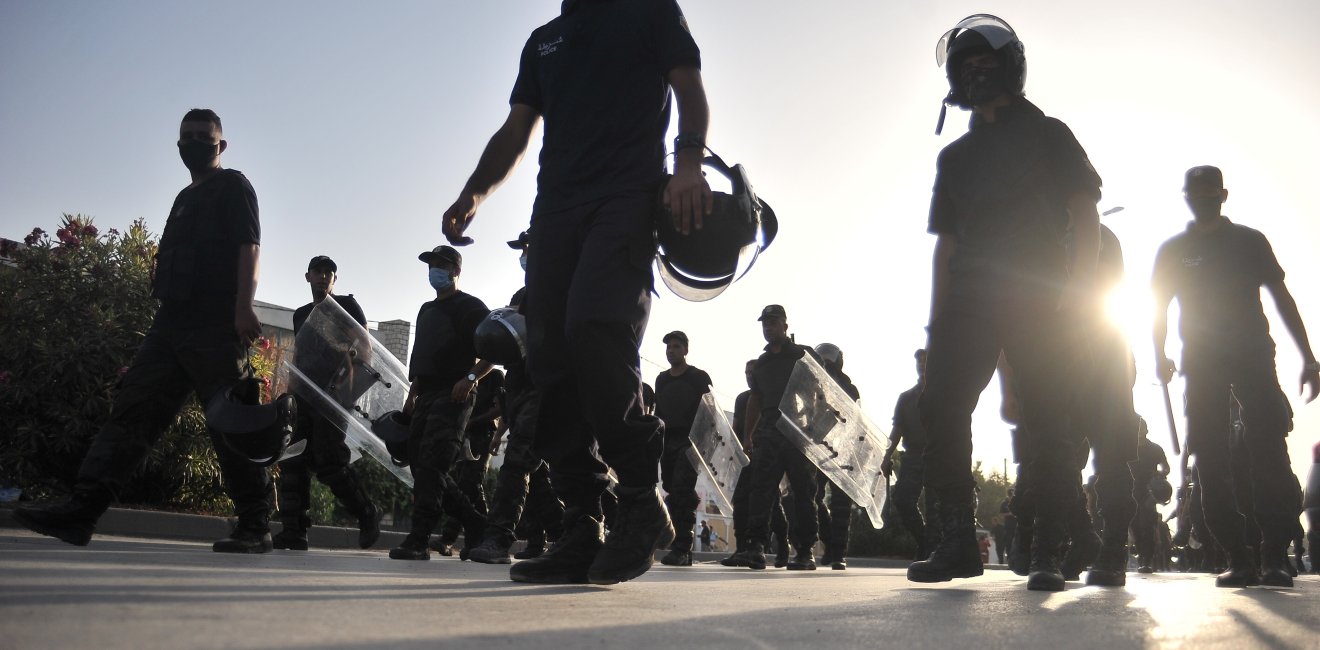The recent political upheavals in Tunisia and Sudan have served as a sobering reminder that democracy is in deep trouble in the unsettled Arab world, just as the Biden administration is organizing a summit of democratic countries aimed at combating the galloping spread of authoritarian rule around the globe. The virtual Summit for Democracy is scheduled to take place on December 9-10, and so far only Israel and Iraq are on the list of Middle East invitees.
Still, Tunisia and Sudan are likely to weigh heavily over the proceedings as the latest examples of failed transitions from dictatorship to democracy. On the African continent a total of five coups has already taken place this past year, the most in decades. Many pro-democracy activists have been particularly upset by the administration’s lukewarm support for the struggle to restore democratic rule in Tunisia. There, the incumbent civilian president in July dissolved parliament and the government and allocated the making of all laws to himself.
The return of autocratic rule in Tunisia has been particularly heart-rendering for activists and presented the Biden administration with a dilemma about how to deal with a “civilian coup.”
The return of autocratic rule in Tunisia has been particularly heart-rendering for activists and presented the Biden administration with a dilemma about how to deal with a “civilian coup.” The North African country was the birthplace of the pro-democracy wave that rolled over the Arab world starting in 2011 and toppled four longtime dictators. It produced the only real multi-party democracy that managed to survive for a decade, but is now sliding back toward the autocratic rule that Biden so loudly decries and has promised to confront with his Summit for Democracy.
As pro-democracy activists see it, Tunisian President Kais Saied’s flagrant violation of the constitution last July is just as much a “coup” as what Sudanese Gen. Abdel Fattah al-Burhan carried out in October. The general scraped the Constitutional Declaration agreed upon by military and civilian leaders who together had forced President Omar Bashir from power in April 2019. Their power-sharing deal required that the head of a transitional, mixed civilian-military Sovereignty Council would initially be an army officer but that a civilian would take over after 29 months. The transfer was scheduled to happen in November, but the Sudanese military took over instead.
The question arises why the Biden administration has reacted so differently to events in these two countries in defense of democracy. At first glance, the main difference between the two would seem that Tunisia’s Saied is an elected civilian, while al-Burhan is a military man and is unelected.
In neither case has the administration wanted to designate their seizure of power a “coup.” This may be because Section 508 of the Foreign Assistance Act stipulates that U.S. aid must be cut off “to any country whose duly elected government is deposed by military coup or decree,” and there is no proviso for a presidential waiver. There is no similar stipulation, however, if a civilian president deposes a duly-elected government as has happened in Tunisia.
The Obama administration faced the same dilemma when in July 2013 the military overthrew the elected Muslim Brotherhood government in Egypt. It finessed the question by simply refusing to determine whether this constituted a “coup.” The Biden administration so far has avoided calling what happened in either country a “coup.” But it has nonetheless “suspended” $700 million in aid for Sudan and put on hold $500 million in new economic aid for Tunisia last June, in addition to the $1.5 billion already provided since its 2011 pro-democracy uprising.
In both, too, civil society groups and political parties failed to deal either with their own ever-widening internal divisions or the economic catastrophes befalling their countries.
In some respects, the circumstances surrounding the July 25 coup in Tunisia and October 25 one in Sudan bear a remarkably close resemblance. Both countries have lived mostly under dictatorships since their independence in 1956, a military one in Sudan and a civilian one in Tunisia. Both countries saw a popular uprising that led to the overthrow of their dictators, President Zine el-Abidine Ben Ali in Tunisia in 2011 and President Omar Bashir in Sudan two years ago. Both are also suffering devastating economic conditions made worse by the Covid-19 pandemic. In both, too, civil society groups and political parties failed to deal either with their own ever-widening internal divisions or the economic catastrophes befalling their countries.
A closer examination, however, reveals a number of significant differences. First, Tunisian President Saied, a 61-year-old law professor, won the 2019 presidential election in a landslide, taking 73 percent of the vote. He belonged to none of the existing political parties whose squabbling had alienated the vast majority of Tunisians from the political process. (Only 41 percent of registered voters bothered to participate in the 2019 parliamentary elections). In Sudan, on the other hand, the two top coup leaders, Gen. al-Burhan, head of the ruling Sovereign Council, and his deputy Gen. Mohamed Hamdan Dagalo, were unelected and have so far mobilized scant public support.
The public reactions to the two coups has been notably different as well. In Tunisia, the disenfranchised political parties have periodically organized demonstrations in the capital and major towns, but the turnouts have not been impressive or sustained. Most noteworthy is that the powerful General Union of Tunisian Workers (UGTT), which played a seminal role in the 2011 uprising, has so far not thrown its weight into the pro-democracy struggle. For example, it has yet to call for a general strike or even limited ones.
Why the powerful UGTT with its one million members has shown so little enthusiasm to defend democracy is unclear. But its distinctly pro-socialist leadership has no sympathy for the Islamist Ennahda Party whose leader, Rachid Ghannouchi, was speaker of the disbanded parliament. If President Saied were to resign, the speaker would be in line to become temporary president.
They have also thrown up barricades and organized neighborhood defense committees in the capital. The military has kept their ardor at a boil by so far killing upwards of 40 protesters.
In Sudan, on the other hand, the civil society groups led by teachers, doctors, lawyers, and labor union leaders who led the uprising against President Bashir in 2019 have repeatedly turned out their followers in the tens of thousands on the streets of Khartoum and other cities. They have also thrown up barricades and organized neighborhood defense committees in the capital. The military has kept their ardor at a boil by so far killing upwards of 40 protesters.
Yet another difference has been the reaction of the outside world to the two cases. The 55-nation African Union immediately expelled Sudan from its ranks, while it has yet to take the same action in the case of Tunisia. The 22-nation Arab League called upon the Sudanese military to “fully abide” by its agreement with the civilian leadership, while the U.N. Security Council issued a statement calling for the restoration of “civilian-led transitional government” in Sudan.
President Biden also issued a statement insisting that “the civilian-led transitional government must be restored” followed by a joint declaration with the United Kingdom, Saudi Arabia and the United Arab Emirates demanding the same. (Both Arab countries have in the past shown strong support of the Sudanese military in its periodic struggle with pro-democracy activists.)
None of these governments or international bodies has so far come out so strongly on behalf of civil society groups and political parties agitating for the restoration of democratic rule in Tunisia.
Now the situation in Sudan has suddenly become far more complicated for the Biden administration. The civilian prime minister, Abdalla Hamdok, whom the military had ousted in the coup, agreed on November 21 to return and serve under Gen. Burhan. The General still leads the ruling Sovereign Council, now purged of protest leaders and reconstituted to include his choice of its civilian members. Hamdok also promised to form “an independent technocratic cabinet” until elections can be held some time in 2023. For its part, the military has purportedly agreed to release all political prisoners and restore the 2019 Constitutional Declaration negotiated with protest leaders as the roadmap toward full civilian rule.
Hamdok, previously a high-ranking U.N. official, was never part of the 2019 uprising, and his decision has caused an uproar in the ranks of the civilian opposition, which has quickly denounced his agreement with the military. It has been demanding in almost daily street demonstrations since October 25 that the military leave politics to civilians and withdraw permanently to its barracks. Even most of Hamdok’s old ministers have resigned in protest.
The Biden administration seems uncertain about how to react to the latest events there. Secretary of State Antony Blinken tweeted that he was “encouraged” by the news of Hamdok’s reinstatement as prime minister and the military’s promise to release all political prisoners. He urged both military and civilians to redouble their efforts to follow “a civilian-led path to democracy in Sudan.” But he sidestepped the fact the military remains very much the leader of this process, and he seemed ready to follow the Obama administration in refusing, once again, to determine whether a “coup” ever took place.
The views expressed in these articles are those of the author and do not reflect an official position of the Wilson Center.
Author

Former Washington Post Middle East Correspondent

Middle East Program
The Wilson Center’s Middle East Program serves as a crucial resource for the policymaking community and beyond, providing analyses and research that helps inform US foreign policymaking, stimulates public debate, and expands knowledge about issues in the wider Middle East and North Africa (MENA) region. Read more

Explore More
Browse Insights & Analysis
Georgia’s Unrest and the Country’s Long Road to Europe

Navigating the New Cold War: US-China Relations Post-Election


